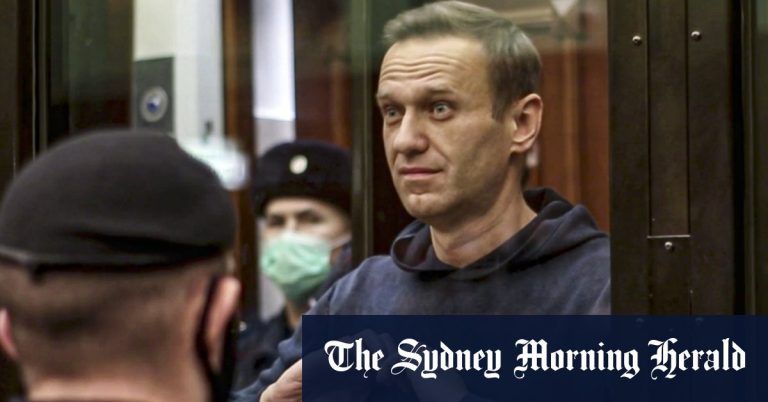Who was blamed for the attack?
The United States directly blamed the Federal Security Service (FSB) for the attack, and the European Union and the United Kingdom said it could only have been done with the spy agency's involvement. Investigative website Bellingcat said in December 2020 that it had identified members of a secret FSB unit specializing in poisoners who had followed Navalny since January 2017. Putin later admitted that Navalny was under surveillance but denied that the government was behind the poisoning. French President Emmanuel Macron called it an “assassination attempt,” then-German Chancellor Angela Merkel visited Navalny in hospital, and the European Union blacklisted six people in Russia allied with Putin over the poisoning case.

Russian opposition figure Alexei Navalny sent a heartfelt message to his wife, Yulia, while he was in a Russian court in early 2021.credit: Moscow City Court
How did he make himself heard?
Navalny had a large following on social media, which made him a target because it allowed him to get his message across despite an effective blackout by Russia's tightly censored television networks. After his arrest, he published an investigation into a giant palace on the Black Sea that he said belonged to Putin. The Kremlin said that was not true, but within days the video became the most popular ever, with more than 120 million views, while a billionaire friend of Putin claimed ownership of the property.
How did the Kremlin try to neutralize him?
Navalny has been in and out of prison since 2011, often on charges of organizing unauthorized protests. He was barred from running in the 2018 presidential election after the Kremlin learned its lesson when Navalny was allowed to run for mayor of Moscow against incumbent President Sergei Sobyanin, a Putin loyalist, in 2013 and received 27 percent of the vote. But he never served more than a month at a time until his last imprisonment.

Alexei Navalny, pictured with his wife Yulia, at Charite hospital in Berlin in 2020 recovering from poisoning.credit: AP via Instagram
Did the Kremlin's tactics work?
Navalny was arrested and jailed after returning to Moscow from Berlin in January 2021, sparking widespread protests. More than 10,000 people were arrested at the marches, as demonstrators braved riot police, freezing temperatures and threats that they could face charges by participating. The demographics of the protests showed why the Kremlin was concerned: according to one poll, the average age was younger than at previous protests, and nearly half of those attending were out for the first time. A subsequent crackdown that banned Navalny's anti-corruption foundation and targeted opponents of all stripes kept protesters off the street.
What am I guilty of?
Russian police detained Navalny on charges of violating the terms of a suspended sentence after he failed a check while recovering in Germany. A Moscow court ordered him to be imprisoned for violating his parole after he was convicted of fraud in 2014, in a case the European Court of Human Rights described as politically motivated. The two-and-a-half-year sentence was just the beginning, and in March 2022, he was sentenced to an additional nine years in a maximum security prison for fraud and contempt of court.

Alexei Navalny, pictured amid a 2018 march in Moscow. credit: AP
What action was taken?
The Biden administration announced its first sanctions against Russia in March 2021. The sanctions — like those adopted by the European Union — targeted senior Russian law enforcement officials, in addition to broadly identical sanctions that the European Union and the United Kingdom had earlier imposed on other Russians allied with Putin. . In response to the attempted murder of Navalny. But the proceedings in Navalny's case have been overtaken by the international condemnation sparked by Russia's invasion of Ukraine and the far-reaching sanctions imposed afterward by the United States and its allies.
Were there other cases of poisoning?
Yes. There have been high-profile poisonings of former intelligence officers living in exile in the UK: Alexander Litvinenko was given a fatal dose of polonium 210 in his tea at a London restaurant in 2006, while Sergei Skripal survived an assassination attempt with Novichok in 2018. Mikhail Khodorkovsky's Russia Open chief coordinator, Vladimir Kara-Murza, was tracked by the same FSB team linked to Navalny's poisoning before he was twice subjected to near-fatal attacks, Bellingcat reported in February 2021.
download
Does the opposition have other leaders?
Navalny, who combined charisma with a sophisticated understanding of how to use social media to bypass the Kremlin's obfuscation, was the most visible leader among Russia's divided anti-Putin bloc. The crackdown on dissent since the invasion of Ukraine has further marginalized the opposition, with Putin adopting former Soviet leader Joseph Stalin's language of condemning opponents of the war and describing them as “traitors.”

